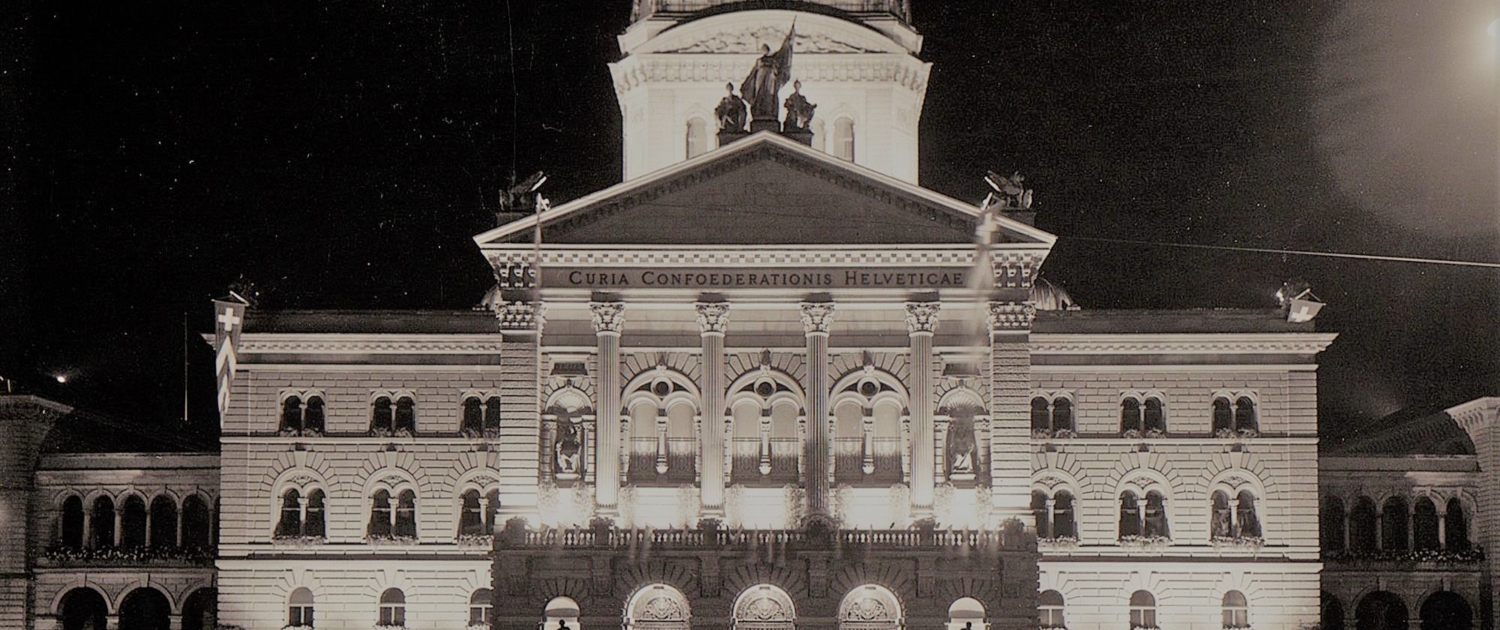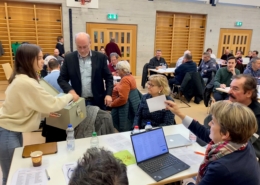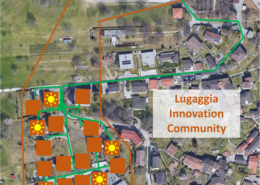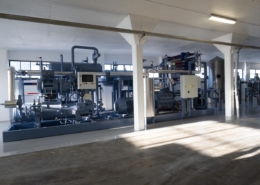90 years of the Swiss Federal Office of Energy: How the increasing export of electricity led to its foundation in 1930
The Swiss Federal Office of Energy will be 90 years old on 1 October 2020. 90 years in which the office has operated under three different names - Federal Office of Electricity, Federal Office of Energy and finally Federal Office of Energy (SFOE). 90 years under the leadership of just five (!) directors. 90 years marked by supply crises, numerous technological innovations and energy policy debates.
In a three-part blog series we look back on eventful decades. In the first part you can read how it all began.
"There is no need to create a new Electricity Board. One must strive to get along with the existing supervisory bodies and not unnecessarily expand the federal administration." (Source: Neue Zürcher Zeitung 6.11.1929)
The Federal Council wrote this in 1928 in response to a postulate from the National Council.
Enthusiasm sounds different. The Federal Council did not need a new office to compile statistics on production and consumption or on the import and export of electricity 
The question of an independent Federal Office for the Electricity Industry first arose in 1921 - initially indirectly. Bernese National Councillor Gottfried Gnägi, farmer and father of the later Federal Councillor Rudolf Gnägi, was concerned about Switzerland's electricity supply. He wanted the Confederation to take the helm in order to "ensure rational and planned development". This would have required a new federal office, but Gnägi had not explicitly demanded this in his proposal.
The background to Gnägi's advance: electricity consumption had risen sharply in the post-war years. Instead of petroleum lamps, electric lights were on, motors were powered by electricity. You can read more about the energy issues in the post-war period in the blog "1918: War, energy shortage, Spanish flu - Part 2"
Wild growth in the construction of hydropower plants
At the same time, many hydroelectric power plants were built during this period, also in response to the shortage of coal and petroleum during the First World War. This boom caused the prices for electrical energy to plummet. However, the Federal Council did not want to talk the cantons, which granted the concessions for the use of hydropower, into believing that they were not entitled to do so.
Two years later the call for a new authority was unmistakable. A man from Berne - SP National Councillor Robert Grimm - also put the issue on the political agenda. In his postulate in 1923 he demanded
"The Federal Council is invited to examine and report to the authorities: (1) whether the practice of granting export licences for electrical energy should not be changed in such a way that in future export licences will only be granted if the quantity of energy concerned has been offered for domestic consumption at export prices; (2) whether the exchange of energy within Switzerland through the busbar system should not be regulated by the federal government
Grimm feared that domestic electricity would be sold abroad cheaply and demanded that "domestic demand must be ensured before export demand is satisfied".
"Strong hunger for energy abroad"
In his speech to the National Council, which was printed in the newspaper of the Swiss Metal and Watch Workers' Union SMUV in July 1930, Grimm said: "There is a very strong hunger for energy abroad. The need for electricity is actually only just beginning to emerge there. So they will try to place the newly gained energy abroad as far as possible
For Grimm, the question did not arise whether Switzerland should export electricity or not. Rather, the question was how to use this "national raw material" in the interests of the Swiss economy.
Cotton against electricity
"No sensible person who has insight into the circumstances will want to say that Switzerland should not export any energy at all, that no kilowatt hour should go abroad We are in exactly the same situation as those countries from which we have massive imports of raw materials and food." He referred to cotton or iron, goods for which Switzerland was dependent on imports. In other words, if Switzerland imposes restrictions on electricity exports, the other countries could impose restrictions on their own.
In the meantime, Switzerland had become a major exporter of electricity. And Grimm reckoned to the National Councillors: "In 1916, exports accounted for 296 million kilowatt hours, in 1929 for 1.059 billion, which means that the export quota has risen from 18 to 28 percent and accounts for almost a third of total production In 1916 (i.e. during World War I), 1.45 billion kilowatt hours were produced,in 1929 it was more than twice as much, 3.763 million kilowatt hours.
He was therefore of the opinion that "it is the responsibility of the Confederation to clarify the situation and take the necessary measures to protect domestic consumption"
Federal concession for hydropower
"We must be informed about our production possibilities, about the sales possibilities, we must know the demand, we must order the relationship between domestic consumption and export, otherwise we will be able to mismanage the good that nature has entrusted to us in such a rich way and suffer other economic damages (From: SMUV newspaper of July 19, 1930)
All power to the covenant was Grimm's watchword. The Confederation was to grant concessions for all major hydropower. And the state was to operate the power stations so that it had the use of the works and the regulation of sales in its own hands.
A federal concession for hydroelectric power plants: This idea of Grimm's did not prevail. In the end, the Federal Council also considered it sensible for the Confederation to have figures and statistics on the production and consumption, import and export of electricity.
In January 1930, the Federal Council decides to create the Federal Office of the Electricity Industry - initially on a provisional basis.
The tasks of the new Federal Office:
The Office shall take up its duties on 1 October. The budget for the year 1931 provides for 250'000 francs for the newly created Office. It is subordinate to the Post and Railway Department.
The first director will be the 36-year-old electrical engineer Florian Lusser, who previously worked at the Brusio power plants in Poschiavo GR. He had eight employees to manage. The Federal Council appointed Harold Zangger as his deputy. Zangger died only two years later as a result of influenza.
Director Florian Lusser and Deputy Director Harold Zangger in front of the headquarters of the new Federal Office
The Office of the Electricity Industry was located at Bollwerk 27 in Berne. The Swiss Confederation had bought the Belle Epoque building in 1907 when the operators of the Hotel National there went bankrupt. Where once illustrious guests came and went, figures on electricity production and consumption, among other things, were now bundled and evaluated.
In the second part of the blog, acting director Benoît Revaz and the two former directors Eduard Kiener and Walter Steinmann look back. In the panel discussion on the SFOE's 90th birthday, you will learn how the oil crisis, the reactor accident in Chernobyl and Fukushima changed the SFOE's priorities and why trips abroad were not welcome in the past.
 Parlamentsdienste 3003 Bern
Parlamentsdienste 3003 Bern
 BFE - Clemens BolliRegionalkonferenz Nördlich Lägern: Kontinuität mit neuem Co-Präsidium
BFE - Clemens BolliRegionalkonferenz Nördlich Lägern: Kontinuität mit neuem Co-Präsidium  Azienda Elettrica di Massagno (AEM)Chi ha paura dell’RCP?
Azienda Elettrica di Massagno (AEM)Chi ha paura dell’RCP?  BFEStandortsuche Tiefenlager radioaktive Abfälle: Co-Präsident der Regionalkonferenz vernetzt sich international
BFEStandortsuche Tiefenlager radioaktive Abfälle: Co-Präsident der Regionalkonferenz vernetzt sich international  Aneo Industry Wärmepumpen machen Dampf
Aneo Industry Wärmepumpen machen Dampf 
 Swisscom
Swisscom BFE
BFE
Dein Kommentar
An Diskussion beteiligen?Hinterlassen Sie uns Ihren Kommentar!